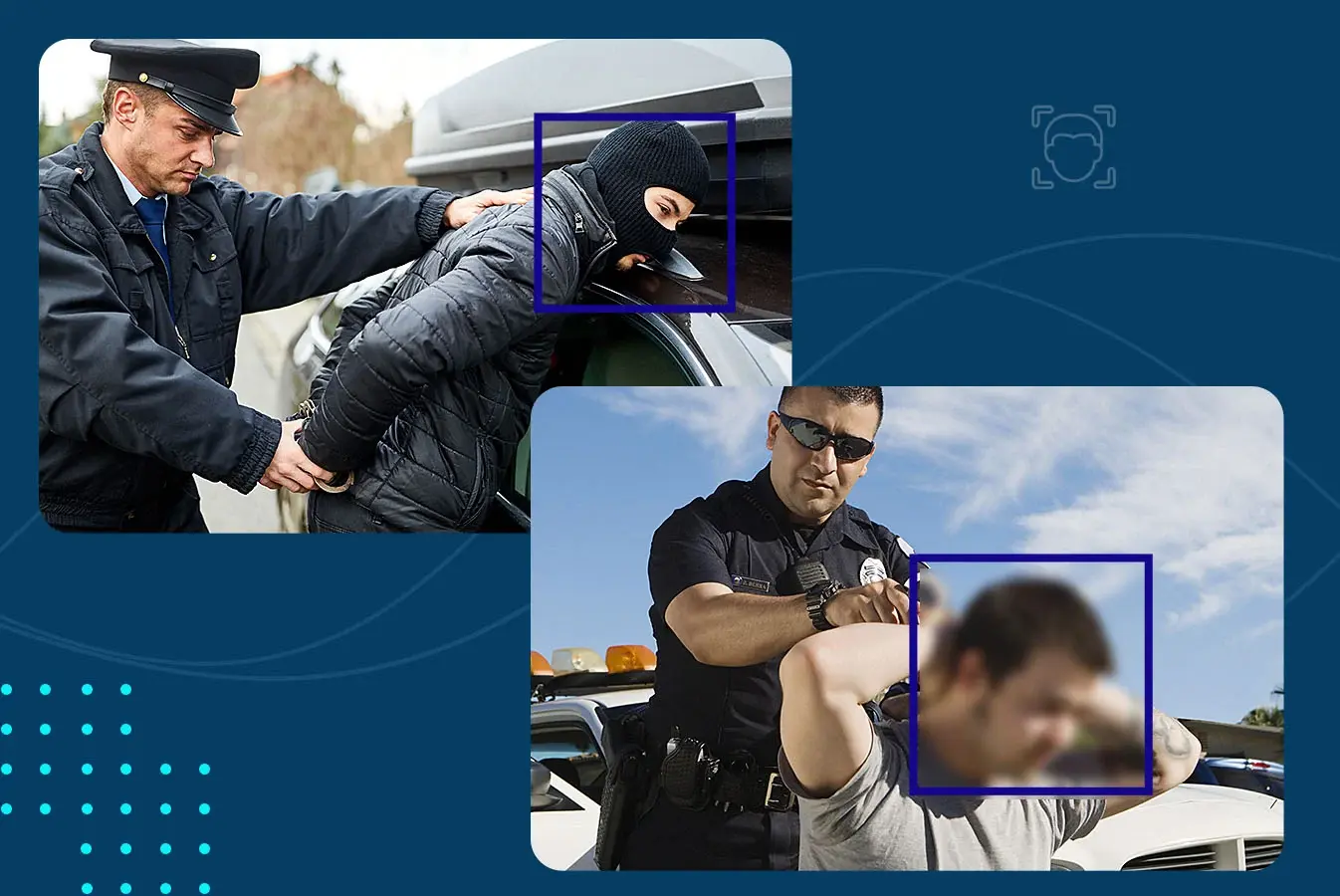In an era defined by digital data, privacy and data protection have become the biggest challenge for law enforcement agencies. Law enforcement agencies are bound by privacy laws that give specific regulations regarding the disclosure of personally identifiable information (PII), Protected Health Information (PHI), etc. Failing to handle redactions in a compliant manner can end in lawsuits and penalties.
As guardians of justice, the responsible management of sensitive data is very important for law enforcement agencies. Using redaction, agencies can ensure data privacy and avoid harsh legal and ethical consequences.
This blog covers the ethical and legal implications for law enforcement agencies and guidelines of the International Association of Chiefs of Police (IACP) for agencies for redacting and handling sensitive data.
Why Redaction Matters in Law Enforcement
Redacting sensitive information is of utmost importance in the law enforcement landscape. In fact, failing to redact confidential information can prove to be highly dangerous. Here is why redaction matters in law enforcement:

Massive Data Volume
The amount of data collected by law enforcement agencies is huge. About 3.3 trillion of video footage is captured through video surveillance cameras daily. Thus, with the increase in data, redacting sensitive information takes lots of time and requires a large workforce.
Regardless of whether the data is in the form of video, audio, image, or document, the need to have this data properly managed, protected, accessed, and retained doesn't change. As law enforcement agencies strive to foster public trust and maintain the delicate balance between revealing information and protecting sensitive data, redaction emerges as a critical tool.
Preserving Data Integrity
When dealing with sensitive information during an investigation, law enforcement agencies accumulate data, some of which might be unrelated to the case or not subject to public disclosure. By redacting irrelevant or sensitive information, agencies can protect the integrity of ongoing investigations and prevent unintended leaks of details that could compromise their work and reputation.
Compliance and Data Security
Amidst the challenge of managing data, law enforcement agencies should also navigate ethical considerations and regulatory requirements. This process ensures that crucial details are concealed when sharing information with the public, the media, or even other agencies, while sensitive information remains securely shielded from prying eyes. This way, law enforcement agencies can fulfill the ethical implications and meet various compliances such as FOIA and HIPAA.
Legal Considerations: Navigating Data Privacy Laws
More than half of all medium-to-large police departments in the US now use or are pilot-testing body-worn surveillance camera programs. In this increasing collection of evidence, there is private citizen information that law enforcement agencies should hide from the naked eye. This is due to the compliance that requires agencies to protect this data when sharing video evidence.
Freedom of Information Act
The Freedom of Information Act (FOIA) is a crucial piece of legislation that promotes transparency, accountability, and openness in government operations. Enacted in the US, FOIA grants citizens the right to access government records and documents, ensuring that the government's actions are subject to public scrutiny.
Under FOIA, individuals and organizations can submit requests to government agencies for records, documents, and information. These requests can pertain to a wide range of topics, including policies, decisions, contracts, research, correspondence, and more. The government is required to disclose requested information unless it falls under specific exemptions outlined in the law.
Other major compliances include the Health Insurance Portability and Accountability Act (HIPAA) and the Criminal Justice Information Services (CJIS) security policy that carries considerable weight.
Health Insurance Portability and Accountability Act
HIPAA is a significant piece of legislation enacted in the US to ensure the privacy, security, and confidentiality of individuals' protected health information (PHI) while also promoting the efficient exchange of healthcare data. HIPAA consists of two main components: the Privacy Rule and the Security Rule.
The Privacy Rule establishes standards for safeguarding individuals' PHI, which includes any health-related information that could be linked to an individual.
The HIPAA Security Rule focuses on the technical and administrative safeguards that healthcare entities must implement to protect electronic PHI (ePHI) from unauthorized access, use, or disclosure.
Criminal Justice Information Services (CJIS)
The Criminal Justice Information Services (CJIS) provides law enforcement agencies and authorized organizations with access to critical criminal justice information and services. CJIS plays a pivotal role in promoting information sharing, enhancing law enforcement capabilities, and ensuring the security and integrity of sensitive data.
Navigating these diverse regulations is essential for law enforcement agencies to ensure proper redaction that respects the privacy and security of individuals' information.
Ethics in Redaction: Doing the Right Thing
The Depth of Ethics in Redaction
Ethics in the context of redaction extends far beyond the mere act of blacking out words on a page and faces in a video. It’s about upholding the fundamental principles of fairness, integrity, and respect while navigating the delicate process of concealing sensitive information.
The ethical dimensions of redaction become especially crucial in law enforcement, where maintaining a balance between transparency and privacy is imperative. It will help agencies build transparency and trust with their communities.
Upholding Dignity and Privacy
Consider when a law enforcement agency is tasked with releasing video evidence to the public. In this situation, ethical redaction means not only adhering to legal requirements but also preserving the dignity and rights of those featured in the footage by ensuring that bystanders' identities, unrelated personal information, and confidential details remain hidden.
It is a practice that acknowledges the importance of treating individuals with dignity, respecting their rights, and upholding the principles that make a just and responsible society. In the realm of redaction, ethics isn't just a guideline—it's a compass guiding us toward a harmonious balance between openness and protection.
IACP Guidelines for Handling Sensitive Data
The International Association of Chiefs of Police (IACP) is a globally recognized organization that allows law enforcement professionals to collaborate, share insights, and develop best practices to enhance law enforcement standards and promote public safety.
The document produced by IACP encourages agencies to collaborate and share insights into effective redaction practices, specifically concerning data gathered through Body-Worn Cameras (BWCs).
Agencies should take into account the potential impact of BWC recordings on victims and witnesses. This includes considerations such as lack of privacy, unintentional capture of confidential information, and cultural concerns.
In the words of the IACP regarding redaction practices, “In cases where others may be reviewing video(s), preserving the dignity of individuals in the recordings should be a priority.”
VIDIZMO Redactor for Law Enforcement
VIDIZMO offers a comprehensive redaction solution with VIDIZMO Redactor. VIDIZMO’s powerful redaction software leverages AI-powered redaction for redacting sensitive information in videos, audio recordings, images, and documents.
VIDIZMO Redactor excels in video redaction through techniques like blurring, pixelation, or employing a black opaque box to obscure specific objects. With VIDIZMO Redactor, law enforcement agencies can:
- Redact sensitive elements, like faces, license plates, weapons, etc., ensuring consistent AI-powered video redaction.
- Bleep or mute specific audio clips containing sensitive information in audio files, such as 911 calls.
- Redact scanned documents with optical character recognition (OCR).
- Comply with federal and state-level regulations, including CJIS, FOIA, and more.
- Edit videos to eliminate unnecessary segments from videos or divide videos into multiple sections.
- Secure data with data encryption, password protection, SSO integration, and a lot more.
What are you waiting for? Sign up for our 7-day free trial and try all these features for free today.
Posted by VIDIZMO Team
We at VIDIZMO are experts in secure and compliant video streaming and digital evidence management. Our aim is to help educate such that you can better utilize your video data.


